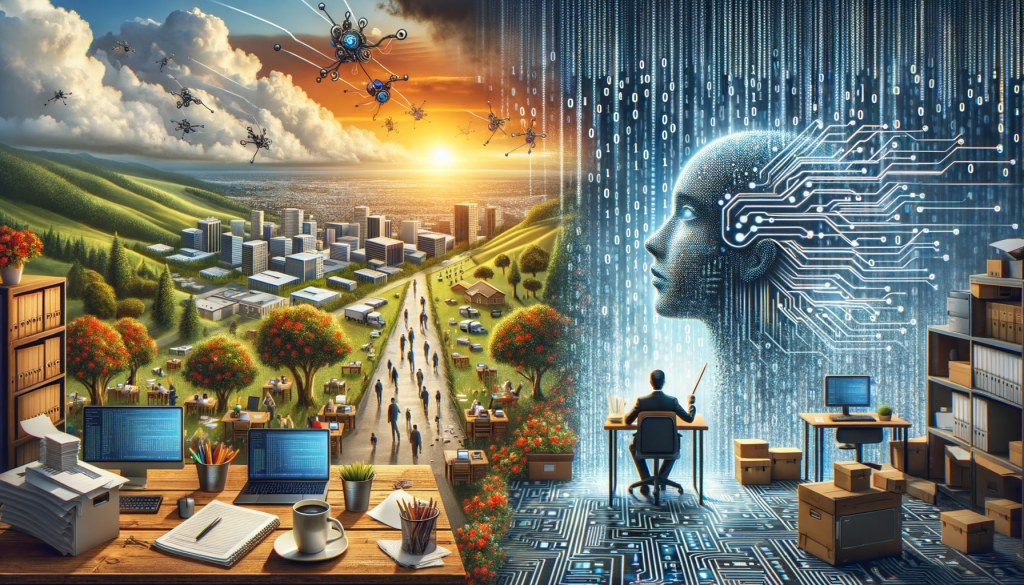AI’s Role in Revolutionizing Software Development
AI, or artificial intelligence, is playing a significant role in revolutionizing software development. With the rapid advancement of AI technology, developers can now leverage AI to streamline and enhance various aspects of the software development process.
One key area where AI is making a profound impact is in automating repetitive and mundane tasks. AI-powered tools can now assist developers in writing code, debugging, and testing software. This automation not only saves time but also reduces the likelihood of human error, resulting in more efficient and reliable software development.
Another way AI is revolutionizing software development is through its ability to analyze and understand vast amounts of data. AI algorithms can process and make sense of complex datasets, enabling developers to gain valuable insights and make informed decisions. This data-driven approach helps in identifying patterns, predicting bugs or issues, and optimizing software performance.
AI is also transforming the way software is designed and user interfaces are created. Natural Language Processing (NLP) and Machine Learning (ML) algorithms can analyze user feedback, preferences, and behavior to understand and adapt to user needs. This allows for the development of personalized and intuitive software experiences, ultimately improving user satisfaction.
Furthermore, AI is revolutionizing software development by enabling the creation of smart software systems. AI algorithms can be trained to learn and improve over time, making software capable of adapting to changing conditions and providing intelligent responses. This opens up new possibilities for developing innovative and dynamic software solutions that can constantly evolve and meet evolving user demands.
In summary, AI is playing a transformative role in software development. From automating repetitive tasks to analyzing data, enhancing user experiences, and creating intelligent software systems, AI is revolutionizing the way software is developed and improving its overall quality and efficiency.
Enhancing Efficiency and Productivity with AI in Software Development
AI has had a significant impact on software development, enhancing efficiency and productivity in various ways. By leveraging AI technologies, software developers are able to automate repetitive and time-consuming tasks, allowing them to focus on more complex and creative aspects of their work.
One way AI enhances efficiency is through automated code generation. AI-powered tools can analyze existing code and generate new code snippets, reducing the time and effort required to write code from scratch. This not only speeds up the development process but also helps maintain code quality and consistency.
AI also plays a crucial role in bug detection and fixing. Machine learning algorithms can analyze large volumes of code and identify potential bugs or vulnerabilities, enabling developers to address them before deployment. This helps in reducing the number of bugs that make it to the production stage, resulting in more reliable and secure software.
Another area where AI improves efficiency is in software testing. AI-powered testing tools can automatically generate and execute test cases, significantly reducing the time and effort spent on manual testing. These tools can also identify patterns in test results and prioritize the most critical areas for further testing, ensuring comprehensive test coverage.
Furthermore, AI can enhance productivity by assisting developers in the decision-making process. AI algorithms analyze data from various sources, including user feedback, market trends, and performance metrics, to provide insights and recommendations. This helps developers make informed decisions about feature prioritization, resource allocation, and overall project management.
In addition to these specific use cases, AI can also improve collaboration and knowledge sharing among developers. Natural language processing algorithms can analyze code repositories, documentation, and online forums to provide contextually relevant suggestions and solutions. This promotes a collaborative and knowledge-driven development environment, where developers can learn from each other and leverage collective expertise.
Overall, AI has revolutionized software development by enhancing efficiency and productivity. By automating repetitive tasks, improving code quality, detecting bugs, accelerating testing, aiding decision-making, and facilitating collaboration, AI empowers software developers to deliver high-quality software faster and more effectively.
Addressing Challenges and Limitations of AI in Software Development
AI has undoubtedly revolutionized the field of software development, but it is not without its challenges and limitations. It is important for developers to be aware of these and address them effectively to maximize the benefits of AI in their work.
One major challenge is the lack of transparency and explainability in AI algorithms. While AI can generate highly accurate predictions and solutions, it can be difficult to understand how it arrived at those conclusions. This lack of transparency can be problematic, especially in critical applications that require accountability and trust. To overcome this limitation, developers should prioritize the use of interpretable AI models or develop techniques to explain the decision-making process of complex AI systems.
Another challenge is the ethical considerations surrounding AI in software development. AI algorithms are trained on large datasets, and the quality and biases in these datasets can impact the fairness and inclusivity of the AI system. Developers must be cautious of the potential for AI systems to perpetuate biases or discriminate against certain groups. They should actively work towards ensuring diversity in the training data and regularly evaluate the performance of AI systems for any biases or unfairness.
Furthermore, AI in software development is not a substitute for human expertise and creativity. While AI can automate certain tasks and improve efficiency, it is still important for developers to rely on their own knowledge and judgment. AI should be seen as a tool to augment human capabilities rather than replace them entirely. Developers should continue to cultivate their skills and expertise in order to effectively leverage AI in software development.
- Addressing the challenges and limitations of AI in software development:
- – Prioritize interpretability and explainability of AI algorithms.
- – Mitigate biases and ensure fairness in AI systems.
- – Use AI as a tool to augment human expertise, not replace it.
The Future of Software Development with AI
AI has the potential to revolutionize the field of software development, offering new possibilities and efficiencies. With advancements in machine learning and natural language processing, AI can assist developers throughout the software development lifecycle, from initial planning to deployment and maintenance.
One area where AI is making a significant impact is in the automation of repetitive and time-consuming tasks. For example, AI-powered tools can automatically generate code snippets, saving developers valuable time and effort. These tools can also help with code refactoring, identifying and suggesting improvements to existing codebases.
Additionally, AI can contribute to software testing and quality assurance. By analyzing large amounts of data and patterns, AI algorithms can detect potential bugs and vulnerabilities, helping developers identify and fix issues before they become critical. This can lead to more robust and secure software.
Another way AI is shaping the future of software development is through the use of predictive analytics. By analyzing historical data and patterns, AI can provide insights into potential future issues and trends, allowing developers to proactively address them. This can lead to more accurate estimations of project timelines and better resource allocation.
Furthermore, AI can enhance collaboration and communication among development teams. Natural language processing algorithms can assist in generating documentation and improving code readability. AI-powered chatbots can provide instant support and answer common developer queries, reducing the need for manual intervention.
However, it is important to note that AI is not meant to replace human developers. Instead, it should be viewed as a powerful tool that can augment their capabilities and enhance their productivity. Human expertise is still invaluable in critical decision-making processes and understanding the context and nuances of software development.
In conclusion, the future of software development with AI is promising. As AI continues to advance, developers can leverage its capabilities to streamline processes, improve software quality, and enhance collaboration. By embracing AI technologies, software development can become faster, more efficient, and ultimately deliver better results.
AI-powered Tools and Technologies Transforming Software Development
AI-powered tools and technologies have revolutionized the field of software development, streamlining processes and enhancing productivity. These advancements have enabled developers to build high-quality software faster and more efficiently.
One of the key areas where AI has made a significant impact is in code generation. AI-powered code generators can automatically generate code snippets or even entire modules based on predefined requirements or patterns. This not only saves developers time but also reduces the likelihood of human error. Additionally, AI can analyze existing codebases and provide suggestions for code optimization, leading to more efficient and performant software.
Another area where AI is transforming software development is in bug detection and fixing. AI-powered debugging tools can analyze code and identify potential bugs or vulnerabilities, allowing developers to address them before the software is deployed. These tools can also provide suggestions for fixing bugs, saving developers valuable time and effort.
AI-powered testing tools have also emerged as a game-changer in software development. These tools can automatically generate test cases, execute them, and analyze the results. This not only reduces the manual effort required for testing but also improves test coverage and helps identify potential issues at an early stage. Additionally, AI can learn from test results and patterns to optimize testing processes and prioritize critical areas for testing.
Furthermore, AI is being used to enhance collaboration and communication among developers. AI-powered chatbots and virtual assistants can provide instant assistance and answer queries related to software development. They can also facilitate project management by automating routine tasks, scheduling meetings, and providing real-time updates on project progress.
In conclusion, AI-powered tools and technologies have transformed software development by automating repetitive tasks, improving code quality, and enhancing collaboration among developers. As AI continues to advance, we can expect even more innovative solutions that will further revolutionize the software development industry.
Ethical Considerations in AI-driven Software Development
As AI-driven software development continues to advance, it is crucial to address the ethical considerations surrounding its implementation. While AI technology offers numerous benefits and possibilities, there are potential risks and implications that need to be carefully navigated.
One of the primary ethical concerns is the potential for bias in AI algorithms. AI systems learn from vast amounts of data, and if the data used to train them is biased, it can perpetuate and amplify existing societal biases. This can lead to discriminatory outcomes, reinforcing inequalities, and exacerbating social issues. It is essential for developers to be vigilant in identifying and mitigating bias within their AI models.
Transparency and accountability are also crucial in AI-driven software development. As AI systems become more complex and autonomous, it can be challenging to understand how they arrive at their decisions. This lack of transparency can lead to distrust and concerns about the fairness of AI-driven systems. Developers should strive to create transparent AI models and provide clear explanations of how decisions are made to build trust with users and stakeholders.
Privacy is another significant ethical consideration. AI systems often require large amounts of personal data to function effectively. It is essential to handle this data responsibly, ensuring privacy protections are in place to safeguard sensitive information. Developers must adhere to relevant regulations and ethical guidelines to protect user privacy and prevent misuse of personal data.
The potential impact of AI on employment is also a concern. As AI technologies automate tasks traditionally performed by humans, there is a risk of job displacement. It is crucial to consider the societal implications and ensure that the benefits of AI are distributed equitably. Efforts should be made to reskill and upskill workers to adapt to the changing job landscape and ensure a just transition.
Lastly, the safety and security of AI-driven software cannot be overlooked. AI systems can have significant real-world consequences, and vulnerabilities in their design or implementation can lead to unintended harm. Developers must prioritize robust testing, validation, and security measures to minimize the potential risks associated with AI technologies.






As a software developer, I’ve seen the impact of AI firsthand. It has definitely improved our efficiency and productivity. However, there are concerns about job displacement and ethical issues that need to be addressed. How do you think AI will continue to shape the future of software development?
I’m fascinated by the potential of AI in software development. The ability to automate repetitive tasks and enhance decision-making processes is incredible. But I wonder how AI will affect the creativity and innovation aspect of coding. Can AI truly replicate human intuition and creativity in programming?
AI has undeniably revolutionized software development. It has empowered us to build more advanced applications and streamline the development process. However, I’m curious about the challenges in integrating AI into existing development workflows. What are the key obstacles and how can they be overcome?
The impact of AI on software development is immense. It’s changing the way we write code, test applications, and even deploy software. I’ve experienced firsthand how AI-powered tools have accelerated our development cycles. But, are there any potential risks or downsides to heavily relying on AI in software development?